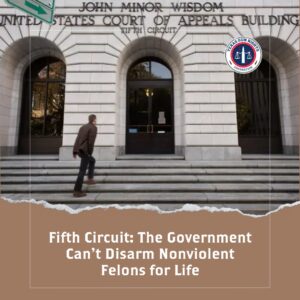July 10, 2024
In a move that has ignited fierce backlash from Second Amendment supporters, the Bureau of Alcohol, Tobacco, Firearms and Explosives (ATF) has once again released sensitive firearm trace data, flouting federal laws designed to keep such information confidential.
For the second time in under a year, the ATF has disregarded the Tiahrt Amendment, which explicitly prohibits the disclosure of firearm trace data outside of law enforcement engaged in legitimate investigations.
This time, the ATF handed over the data to The Trace, a media outlet affiliated with the gun control group Everytown for Gun Safety.
Six months earlier, the ATF released similar data to USA Today following a Freedom of Information Act (FOIA) request, despite firearm trace data being exempt from FOIA.
The Trace had not contested a Ninth Circuit ruling that ordered the release of this protected data to Stop US Arms to Mexico, an Oakland-based nonprofit. This ruling came after the group’s founder, John Lindsay-Poland, requested data on U.S.-made firearms recovered at crime scenes in Mexico and Central America, detailed by the U.S. regions from which they were purchased.
Initially, the ATF denied this request, citing the Tiahrt Amendment. However, Lindsay-Poland sued, and the Ninth Circuit ruled in his favor.
Conversely, the U.S. Court of Appeals for the Second Circuit ruled that such data is protected and cannot be released, creating a split in circuit court decisions.
The ATF and the Department of Justice (DOJ) should have recognized this as an opportunity to escalate the issue to the U.S. Supreme Court.
The Ninth Circuit has a history of having a significant number of its decisions overturned, suggesting a strong chance for a successful appeal. Instead, the ATF opted to release the data.
Chris McNutt, President of Texas Gun Rights, voiced his frustration: “This blatant disregard for the law shows that the ATF is more interested in appeasing gun control activists than upholding their legal responsibilities. They’re not protecting law-abiding gun owners; they’re targeting them.”
The ATF’s actions appear influenced by broader political pressures. Gun control groups like Everytown and Stop US Arms to Mexico are determined to dismantle the Tiahrt Amendment, viewing it as an obstacle to their agenda.
Meanwhile, Mexico is suing several U.S. firearm manufacturers for $10 billion, claiming these companies are responsible for the criminal misuse of firearms by Mexican drug cartels.
This lawsuit, supported by prominent gun control activists, seeks to hold American manufacturers accountable for the actions of criminals abroad.
Joe Biden has made no secret of his stance against the firearm industry. During his campaign, he declared gun manufacturers as “the enemy.” His administration has utilized every available lever to attack the industry, from legislative efforts to executive actions.
Vice President Kamala Harris, assigned to secure the southern border and spearhead the gun control agenda, has seen little progress on both fronts. The newly established White House Office of Gun Violence Prevention, staffed by former Everytown lobbyist Robert Wilcox, further underscores the administration’s commitment to this cause.
Attorney General Merrick Garland, known for his anti-gun rulings, and ATF Director Steven Dettelbach, who halted Operation Thor—a project aimed at disrupting firearm trafficking—are key figures in this contentious approach.
The ATF’s repeated release of trace data undermines ongoing investigations and further alienates themselves from gun owners and the gun industry.
Critics argue that these trace data leaks prove background checks do not work. Chris McNutt stated “All of the guns in the trace data were purchased by individuals who successfully passed a background check. So there is no reason to demonize the stores where these guns were initially sold” highlighting fundamental flaws in current gun control measures that unfairly target legitimate businesses.
Former ATF Acting Director Michael Sullivan emphasized the importance of safeguarding trace data, warning against its use as a political weapon. “If the Tiahrt Amendment were repealed, it could seriously undermine, if not eviscerate, the critically important investigations ATF special agents and local law enforcement are building to bring illegal firearm traffickers to justice,” Sullivan wrote.
The ATF’s decision to release this data twice within six months raises serious questions about the agency’s priorities and its commitment to upholding the laws designed to protect sensitive information.
For many in the gun rights community, these actions are seen as part of a broader strategy to erode Second Amendment protections and vilify law-abiding gun owners and retailers.







